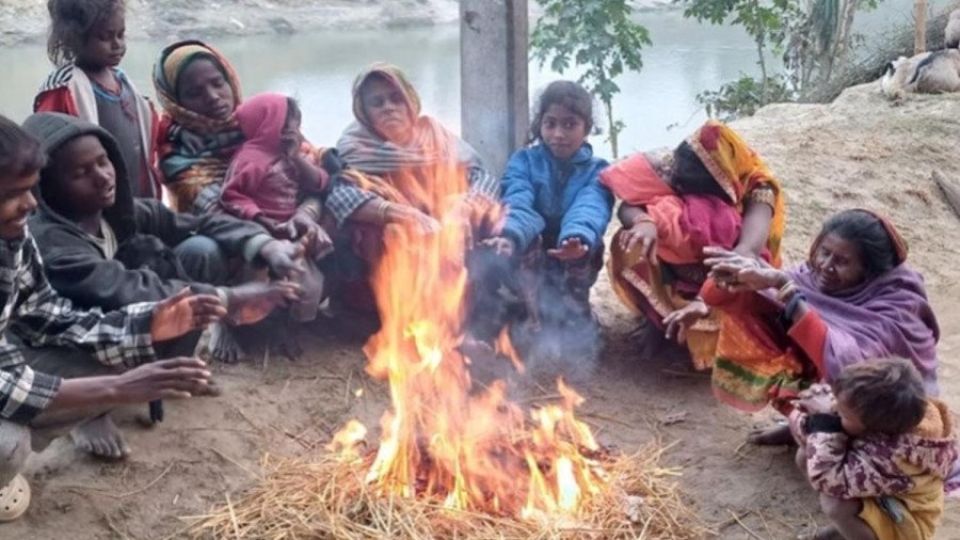January 13, 2025
PARSA/RAUTAHAT/SAPTARI – Joyalas Hawari, 65, sat in her courtyard in ward 3 of Birgunj Metropolitan City-13 on Thursday, basking in the afternoon sun. Despite the brief respite from the cold, she continued to shiver as she wore only light clothing. “The cold has been unbearable for the past week,” she said, her face pointed to the sun.
For Joyalas, the discomfort is compounded by her old ailments that prevent her from moving freely.
“It’s been long since the sun appeared, so I stepped out to warm up,” she explained.
Joyalas, who had been enduring cold nights on a mat with only a thin blanket for cover, said the intensifying cold over the past week had made her daily life increasingly difficult.
The daily life of 71-year-old Sahjahan Ansari from Birgunj-12 has also become challenging due to the cold. Like Joyalas, she also deals with old wounds. The left side of her body became paralysed after she suffered a stroke, and she lost the ability to speak.
Her bed is covered with a plastic mat, with a thin blanket beside her pillow to fend off the cold. Her daughter-in-law, Mayara Khatun, said the chill has made life harder still for her mother-in-law.
“She has been bedridden for a long time, and we haven’t been able to arrange warm clothes or a thick blanket,” Khatun said. “I am worried about how to protect my frail mother-in-law in this cold weather. The cold wave is a major disaster for poor people like us.”
The cold wave has brought severe hardships to impoverished communities in the Tarai region. Lack of warm clothing to shield against the cold has particularly affected children and the elderly, exacerbating their difficulty.
The ongoing cold wave and fog in the Tarai-Madhesh region have disrupted daily life. As mercury has dropped, road traffic has significantly reduced, and the number of children being admitted to hospitals has risen.
The cold wave has disrupted daily life in various settlements of Rautahat, including Dumriya in Chandrapur Municipality-8, Chetnagar in ward 9, and the Dom settlement in Harsaha of Brindaban Municipality.
Sanjay Mallik from Dhamoura shared his family’s struggles due to the freezing temperatures. “We haven’t been able to leave our homes because of the cold,” he said. “Without warm clothes, this cold feels like a curse.”
Health workers have said the cold wave is causing illness among the elderly and children. Dr Abhishek Adhikari of Chandrapur Hospital said that with the drop in temperature, four to five children are being admitted daily due to pneumonia. Children in the Musahar settlement of Chetnagar are also falling ill because of the cold.
As the cold intensifies, children across the district have stopped attending school. In response to the disruption in academic activities, local authorities have closed schools for two days until Friday.
Rautahat Chief District Officer Hiralal Regmi said all 18 local units in Rautahat have arranged for firewood to be lit in marketplaces and junctions.
Musahar community suffers
Nine-month-old Bikky Sada from ward 8 of Tilathi Koiladi Rural Municipality in Saptari has been battling illness for eight days due to the ongoing cold wave. He is suffering from a persistent fever and cold.
“The cold wave has made it impossible for us to work as labourers, and staying at home is unbearable too,” said Bikky’s grandmother, Geeta Devi Sada. “We took him to a doctor in Rajbiraj, but the medicines haven’t helped. His condition has worsened in the cold wave.”
Geeta Devi, who lives in a makeshift hut along the embankment of the Koshi Western Canal, said the entire village is suffering from the cold wave. The settlement, primarily inhabited by the Musahar community, faces severe challenges during this harsh weather.
“Our huts have large holes in the walls, and we live right by the canal. To make matters worse, our houses are fragile and let in the wind,” said Geeta Devi. “Without sufficient bedding and warm clothing, we cannot shield ourselves from the cold.”
The cold wave has disrupted the livelihoods of daily wage earners. “Without work, we can’t even light the stove,” said Geeta Devi.
Warm clothing remains a distant hope. “From morning till evening, we endure freezing winds and frost, with only a fire to rely on,” said another local, Anita Devi Sada. “We don’t have enough clothes, and our flimsy houses can’t block the cold, making survival incredibly difficult.”
Every morning, the entire settlement lights fires outside each house, relying on them for warmth until nightfall, she added. “With no jobs for daily wages, the challenge of putting food on the table has become even more severe.”
Nearby, another Musahar settlement in northern Tilathi Koiladi Rural Municipality-8 faces the same plight. Local Bhulan Sada said lack of sturdy roofs and warm clothing has made it extremely difficult to cope with the cold wave.
“We poor people always face hardships, even from the weather,” Bhulan said. “Floods and rains invade our homes, and now the cold and the frost are taking a toll on us.”


